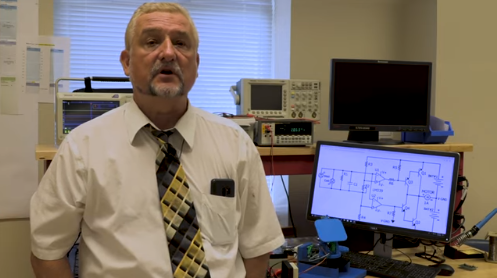
This year marks the third summer that 10 teachers from rural areas in Georgia have come to Georgia Southern University to learn more about renewable energy. Faculty from the Allen E. Paulson College of Engineering and Computing (CEC) and the College of Education helped the teachers bring renewable energy projects and practices into their classrooms.
The National Science Foundation Research Experience for Teachers (NSF-RET) program was funded by ENgaging Educators in Renewable EnerGY (ENERGY), a $525,000 NSF grant, that Valentin Soloiu, Ph.D., Allen E. Paulson Distinguished Chair of Renewable Energy and professor in the Department of Mechanical Engineering, won in 2016. The program aims to help STEM educators at all levels teach their students about renewable energy and to implement it into their classrooms. Georgia Southern is the only university in Georgia to receive the prestigious ENERGY grant from NSF after submissions from universities nationwide.
Soloui is the head of the NSF-RET program at Georgia Southern. He said the program aims to develop a diverse, competitive and nationally engaged teacher workforce through activities and projects performed alongside graduate and undergraduate students, as well as faculty and industry advisors at Georgia Southern University. The goal is to educate, engage, and inspire teachers to bring renewable energy to their classrooms through summer-term interdisciplinary STEM research experiences in the field of engineering and computer science.
Research teams in the CEC work on renewable energy research projects for 10 months before the teachers arrive for their eight weeks of training in the summer. This research includes biologically inspired fin research, which will be used to extract waste thermal energy from exhaust gases; pico-grid (smart house) research, which seeks to minimize the wasted power in smart homes and explore renewable power generation and storage through electric vehicles; biologically inspired flow networks, which will be used to transport thermal energy obtained from the sun to homes for domestic water heating applications; developing vertical axis wind turbines; and solar-tracking systems research, which will help participants engage in deductive reasoning processes.
The summer program then provides the 10 teachers with tangible projects to take back to their classrooms.
“We try to make lesson plans and prototypes for the actual classrooms,” Soloiu said, “We try to implement these technologies on a small scale and in a simplified manner so their students can understand them easily. Some of the teachers developed a robot-type tracker that has solar panels that can orient based on the motion of the sun. The panels recharge batteries that can be used in the classroom.”
The program consists of seven weeks of instruction in June and July and a two-and-a-half-day workshop per semester in the upcoming academic year. The teachers are split into two cohorts consisting of current teachers and emerging teachers who are soon to graduate. Soloiu said teamwork between the teachers is an important part of the program.
“They are all STEM teachers, but they come from different fields,” he said. “They need to work together to patch the knowledge because some will go from science to the more biology oriented and some are more math-oriented, so they have to work together to help their students.”
Soloiu said he will apply for the grant again after the three-year program comes to an end after the upcoming academic year. A total of 30 educators will have completed the program by the end.
Katrina Vaughn, a teacher at Ben Hill Middle School in Fitzgerald, Georgia, said programs like the NSF-RET are a great way to combat the current depletion rate of non-renewable resources.
“I think it’s important for my students to learn about renewable energy, and solar in particular, because we live in Georgia, and we have plenty of sunlight,” she said. “I think it’s important for them to harness those energies and use them in their homes. One of the projects I want my students to do is to build solar panel cell phone chargers. Then hopefully they’ll apply what they’ve learned on a bigger scale when they get older.”


Chattooga Opinions
Medically Supervised Weight Loss: Inside Premier Weight Loss & Medispa

Chattooga Local News
Georgia Power Files Plan for Customer Rate Decrease with Public Service Commission

Chattooga Local Government
Carr Pushes for Permanent Halt of Medicare and Medicaid Funding for Child Sex-Change Procedures

Bulloch Public Safety
02/20/2026 Booking Report for Bulloch County

Bulloch Public Safety
01/26/2026 Booking Report for Bulloch County

Bulloch Public Safety
02/09/2026 Booking Report for Bulloch County

Bulloch Public Safety
02/16/2026 Booking Report for Bulloch County

Bulloch Public Safety
02/02/2026 Booking Report for Bulloch County

Bulloch Public Safety
01/30/2026 Booking Report for Bulloch County






